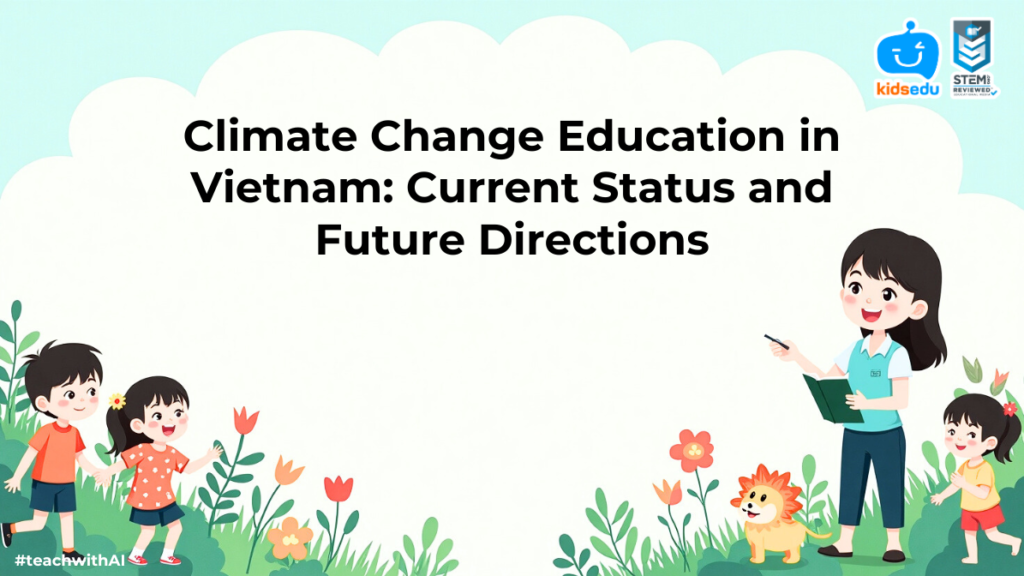Climate Change Context in Vietnam
Vietnam is one of the countries most vulnerable to climate change. According to the World Bank, the country faces high risks from floods, storms, and rising temperatures, especially in major cities like Hanoi and Ho Chi Minh City. Key economic sectors such as agriculture, fisheries, and water resources are significantly affected by extreme weather events.
Although Vietnam has a low CO2 emission rate (approximately 2.6 tons per person in 2020, according to the Global Carbon Atlas), industries such as energy, cement production, and rice cultivation remain major sources of emissions. To address climate change, Vietnam has joined several international agreements, including the United Nations Framework Convention on Climate Change (UNFCCC), the Kyoto Protocol, and the Paris Agreement.
Government Initiatives in Climate Change Education
Recognizing the importance of environmental education, the Vietnamese government has assigned various ministries to implement climate change education and communication programs.
- The Ministry of Natural Resources and Environment is responsible for implementing international climate commitments and managing the National Committee on Climate Change.
- The Ministry of Education and Training integrates climate change education into school curricula, develops teaching materials, and organizes teacher training programs.
- The Ministry of Industry and Trade promotes renewable energy and energy efficiency, while the Ministry of Agriculture and Rural Development focuses on reducing methane emissions from livestock.
Climate Change Education in Vietnam’s School System
1. Climate Change in Preschool, Primary, and Secondary Education
The 2017 General Education Curriculum includes climate change topics in subjects such as Natural Sciences and Social Sciences, helping students understand climate change impacts and response strategies.
Additionally, several educational projects have been implemented, such as the Child-Centered Climate Change Education Project in Thai Nguyen and Hanoi, which raises awareness and develops adaptation skills among students. The Green Schools Initiative (2021-2025) encourages schools to engage in environmental protection activities, such as tree planting and energy conservation.
2. Teacher Training and Educational Materials
To support teachers in delivering climate change education, the Ministry of Education and Training published the Teacher Manual on Climate Change Education (2012). This guide provides interactive teaching methods to help students engage with climate-related topics effectively.
Regular teacher training workshops are also conducted to ensure that educators can integrate climate change knowledge into their lessons.
3. Climate Change Education in Higher Education and Vocational Training
Vietnamese universities have introduced various climate change-related courses, such as the USAID-LEAF Climate Change Education Program, implemented at Dalat University, Vietnam Forestry University, and Vinh University.
Additionally, the Green Building Curriculum, developed in collaboration with the Swiss government, trains students in sustainable architectural design, focusing on energy efficiency and resource conservation.
KidsEdu and Net Zero Education for Young Learners
To help young children understand climate change from an early age, KidsEdu STEM has introduced STEM-based learning programs that make the concept of Net Zero engaging and accessible.
- Hands-on activities: Children participate in simple science experiments on renewable energy, waste recycling, and environmental protection.
- Educational games: Interactive games teach children about the impact of climate change and ways to reduce carbon emissions.
- Mini projects: Kids are encouraged to plant trees, save water and electricity, fostering eco-friendly habits.
Through these activities, KidsEdu not only enhances children’s scientific thinking but also instills a sense of environmental responsibility, contributing to Vietnam’s sustainable development goals.
Climate change education in Vietnam is being actively promoted through policies, training programs, and public awareness campaigns. However, further investment in teacher training, curriculum development, and international collaboration is needed to enhance the effectiveness of climate change education.
Source: UNESCO Report on Climate Change Education in Vietnam



 VietNam
VietNam